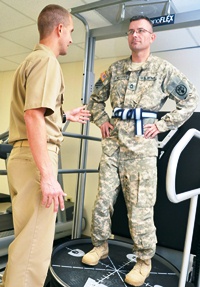
Master Sgt. David McCurry works on the automated balance trainer with Lt. Cmdr. Scott Mitchell, physical therapist and officer-in-charge of the Carl R. Darnall Army Medical Center Traumatic Brain Injury Clinic. McCurry, a National Guardsman with the 168th Aviation Brigade from Pendleton, Ore., suffered moderate TBI after a recent deployment. (U.S. Army photo by Patricia Deal, Carl R. Darnall Army Medical Center, Texas)
Loss and recovery are common themes for individuals with traumatic brain injury (TBI). In my interview with Army Sgt. Mike Ortiz, he revealed his loss and his hope. This is his story.
It’ll be two years this June since I sustained a mild traumatic brain injury while serving in Iraq … since I worked as an Army mechanic … since I felt wholly myself—funny, athletic, outgoing and caring … since my wife said goodbye.
I’m stationed at Fort Bliss, Texas, but hope to find a job as a mechanic closer to where my two-year-old son lives. The Army says I’m fit for duty now (some days I’m still not sure) except for the weight gain from my long rehab. I’ll fix that, but I don’t see my wife and me fixing things. My behavior after the injury was just too hard on her. But, I want to be there for my son.
During my two tours in Iraq, I drove a wrecker, recovering blown-up vehicles and parts. One day, I was in a convoy on unfamiliar roads. In a convoy, you have to keep certain intervals for safety and we kept falling behind, so we punched it. What we didn’t see ahead was a hole in the road made by an improvised explosive device three feet deep and four feet wide—we hit it at 65mph. I tried to bounce with the seat, but there was so much force my head hit the roof like a projectile. When they asked me if I was ok, I said yes. Truth was my back was killing me—I didn’t even think about my head.